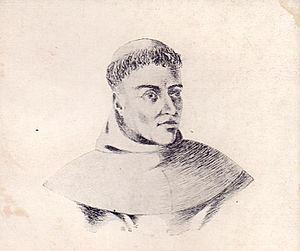Alfonso de Castro facts for kids
Alfonso de Castro (born in 1495 in Zamora, Spain – died on February 3, 1558, in Brussels, Belgium) was an important Franciscan friar, a theologian (someone who studies religion), and a jurist (a legal expert). He was also known as Alphonsus a Castro. He was part of a group of thinkers called the School of Salamanca, who were known for their new ideas in theology and law in Spain. However, Alfonso de Castro himself said he didn't belong to any specific school of thought.
Life of Alfonso de Castro
Alfonso de Castro joined the Franciscan Order when he was just 15 years old. He quickly became known as a very good preacher. He studied theology and philosophy at the University of Alcalá. Later, he became a professor at the famous University of Salamanca. There, along with other scholars, he helped start a "Renaissance of Theology," which meant a new way of thinking about religious studies.
In 1532, he spoke out against the ideas of Martin Luther in Bruges. Because of his strong beliefs, he became an advisor to the Holy Roman Emperor Charles V and the Spanish King Philip II.
Alfonso de Castro also took part in the important Council of Trent meetings in 1545-47 and again in 1551-52. During these councils, he supported both the interests of Spain and the beliefs of the Catholic Church.
In 1553 and 1554, he traveled with King Philip II to England for the king's marriage. In 1557, Philip II chose him to be the Archbishop of Santiago de Compostela. However, Alfonso de Castro passed away before he could officially take on this role. In his final years, he worked as a preacher in Antwerp.
Alfonso de Castro's Writings
In his books, Alfonso de Castro mainly focused on defending what he believed was the "true faith." He did this by writing about criminal law, which are the rules about crimes and their punishments. He made big contributions to criminal law, so much so that in Spain, he was called the "father and founder of criminal law." Outside of Spain, however, he is not as well known.
His first major book was called Adversus omnes haereses libri XIV (meaning "Against All Heresies in 14 Books"). It was published in 1534. This book was like an alphabetical encyclopedia of different types of heresy (beliefs that went against the main church teachings). It listed over 400 kinds of heresy. This book became very important for how people dealt with heresy in the 1500s and 1600s.
Castro's second important work was De iusta hereticorum punitione libri III (meaning "On the Just Punishment of Heretics in 3 Books"), published in 1547. This book was dedicated to Emperor Charles V. It earned him the nickname "flagellum of heretics" (meaning "scourge of heretics"). In this book, he used religious and legal ideas to explain how to deal with heresy. He tried to find a balance between being too harsh and being too lenient. He also wrote about how to bring people back to the "true faith" and how to punish those who refused to change their beliefs.
Alfonso de Castro also wrote a short book about magic, called De impia sortilegarum, Maleficarum, & Lamiarum haeresi, earumque punitione Opvscvlum (meaning "On the Impious Heresy of Sorcerers, Witches, & Lamias, and Their Punishment"). He believed that magic was a type of heresy. He thought that magic, like heresy, should be punished severely. He also wrote that it was important to investigate any agreements people made with demons, as this went against Catholic faith.
His most important work in criminal law was his last book, De potestate legis poenalis libri duo (meaning "On the Power of Penal Law in Two Books"), published in 1550. This book looked closely at what criminal laws are, why we have punishments, and how crimes and punishments are connected. In this book, Castro introduced important ideas like the principle of analogy (applying a law to similar situations) and interpreting laws strictly. He also made the idea of punishment (poena) strongly linked to guilt. This was a new idea at the time. His ideas about punishment influenced later legal thinkers.
After his death, all of his collected works were published in Paris in 1565, in four volumes.
Today, only a few of his works are available in English. These include Against All Heresies (translated in 2021) and a part of his writings defending the education of Indigenous peoples.
See also
 In Spanish: Alfonso de Castro para niños
In Spanish: Alfonso de Castro para niños
 | Bessie Coleman |
 | Spann Watson |
 | Jill E. Brown |
 | Sherman W. White |


